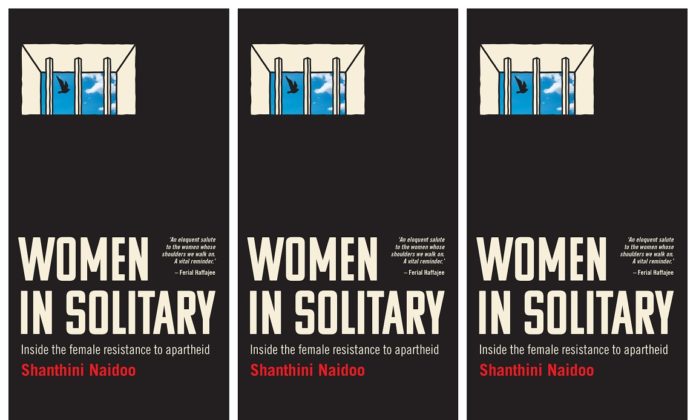In her new book, Women in Solitary: Inside the female resistance to apartheid, author Shanthini Naidoo explores the female experience of activism and how women take on additional political roles to their personal ones. These mothers, daughters and sisters who fought for our democracy, even after their release, are remembered through storytelling – a too for healing generational wounds in South Africa. An extract from the book is published below.
The cells were grey cement floor, and not much else. The draft that came in under the door brought the cold. There was mesh over a single small window, and a naked light bulb, very bright ? for others, no light. Hours became days, became weeks and months with little changing for Nondwe apart from her mind running riot.
‘What did I do for a year? Sjoe. In the morning, I would do my exercises and my loo, then after wash myself in the bucket. I had to get soap, when I could. I had a toothbrush and toothpaste sometimes, but that would get finished and you don’t know when you would get it again. Then, I would wash my clothes and fold them neatly. If you put the clothes under the blanket and sit on it, it would take out some of the wrinkles. Before the loo bucket comes out, the breakfast has already been there waiting.’
Nondwe has a forthright way of storytelling. ‘Some days, they take away the bucket early, other days it is with you when you eat. You don’t see anything or anyone. I don’t even know who took the bucket. The room was so small. We were supposed to have time to exercise but we didn’t get that. Not a single day did I see anyone else. Their plan is that nobody must know who you are. Whenever a door is open you must stand up to attention as a prisoner. Even if you don’t see anyone, you have to do it,’ she says.
She believes that lying on the cold floor made her feel ill for most of the day. ‘If you were a favourite you got an extra mat. Otherwise, we had three thin blankets.’
She, too, feared anything that was given to them. ‘If they gave you medication, you didn’t take it. We didn’t trust them. Something in the food was not right. Maybe it was the cold, maybe the food, but I know for a whole year, my menstruation stopped.’
The international community frowned on South Africa’s detention and treatment of political prisoners, and expected them to be treated well if they were detained.
‘Every second week a magistrate would come around to the cells and ask, “What is your complaint?” He would try to speak English, isiXhosa and isiZulu. After four times of telling him my complaints with no results, I said, “I’m not answering anything” and I just looked at him. Eventually I said, “I’ve been telling you, I don’t get exercise, I don’t get anything from my people, no visits. My people are far away, not even a letter arrives. Why must I say I’m all right?”
That resistance was futile, Nondwe would learn.
‘During the day I walked, up and down the cell. It’s small (1.5 by 4m). One time I found two pins. I took a piece of thread and tried to crochet. Then, I would undo it, and do it again. We had more than a year of this, only interrogation in between and once or twice to the Synagogue for the trial.’
In 2018, sitting down to a meal of chicken and vegetables with the smell and sounds of the ocean nearby, she speaks about the unpalatable conditions of health and nutrition in prison.
‘Food …’ she shakes her head. ‘Pap in the morning, hard mealies for lunch, pap and veg (in the) evening. If there was meat, you just saw a hole (in the starch), the meat was gone before it got to you. Whether it was Christmas or not, we didn’t know. Once when I was in detention in Port Elizabeth, we got a raisin bun for Christmas. But that was our food in Pretoria, every day. If I don’t want to eat, I still had to eat. If there is a worm in the vegetables, or sand, I still had to eat. First you see a worm and get naar (nauseous), then you just move it to the side … or you could eat it,’ she laughs.
All four of the women have told me the solitude and loneliness were far worse than the beatings, putrid food and unliveable conditions.
The only time the detainees could communicate was in the early hours of the morning, or late at night. Despite thick doors and cement separating them, they could hear each other. Some shared recipes. ‘There’s a carrot cake recipe I still use today, I think it was from (the trade unionist) Mrs (Frances) Baard … carrots, raisins, flour and jam,’ Nondwe quips.
After a time, there were clues about other political prisoners interspersed in the prison community.
‘There was a time in the evening when we could talk in the cells. When the warders are gone, you tell your stories by singing in your own language – “My name is Nondwe from the Eastern Cape” – and they wouldn’t know. We would sometimes know who was around by passing the Bible around. We would share the Bible. That helped me, because those people looking after us in the jail wouldn’t tell us who was there and who wasn’t there. So we asked them to pass the Bible to someone and if they do, then you get it back, you know that person is still here. But the warders worked it out. Once they noticed, that stopped.
‘But in that time, we found slowly that there are so many of us in for politics. We spoke to one another. “Where are you from?” I would answer that I’m from Eastern Cape. If they said, “I’m here in jail overnight,” you know it is not a political prisoner. There was a small gap in the door, I used to peep and peep but you couldn’t see much. The door was so thick.’
She once got a clue of a visitor nearby. ‘I heard someone going in and out the whole night,’ she whispers, as if she is back in those quiet cells. ‘The women prisoners said she was coming from hospital. Then she was transferred next door to me and I heard them say, “Winnie, are you okay?” so I knew it was Winnie Mandela. I didn’t know what she looked like. I never even saw her face but I had read about Winnie before. We never met, before. Once I found out it was Winnie, I took my mat and my blankets and leaned myself against the wall.’
Nondwe continues: ‘We didn’t even know each other’s faces. When we talked, I imagined what Winnie was like and she wondered how I looked. We would speak all night, sitting against those walls. We spoke about the children, often. It was heartsore, so we tried to stop talking about kids.
The book is published by Tafelberg and is available online and in store.









